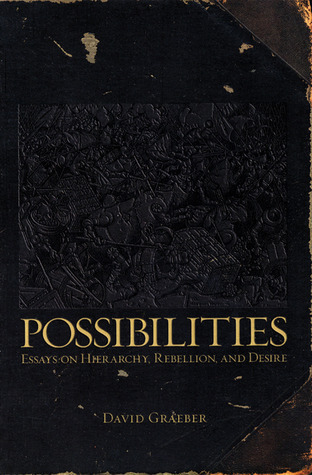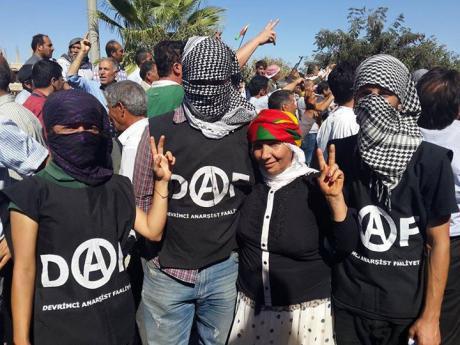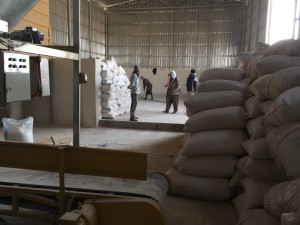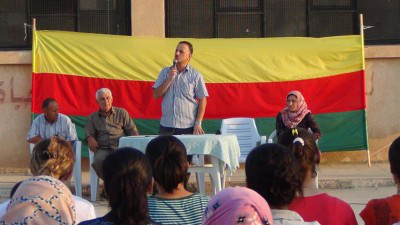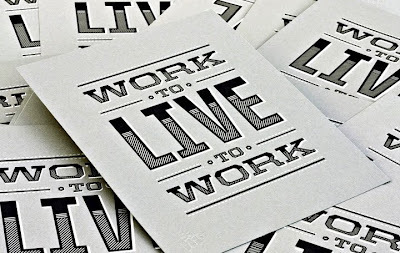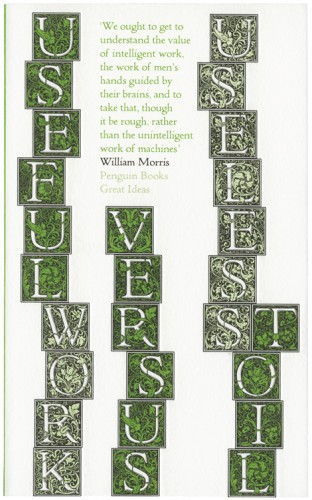
My most recent post was from a group of Brazilian anarchists advocating direct democracy in response to the current political crisis in Brazil. Whether anarchists are or should be advocates of direct democracy is a matter of long-standing debate, going back to the origins of anarchism as a political (or anti-political) movement in the 19th century. Previously, I have posted a number of contributions to this debate from both anarchist advocates of direct democracy and those who argue that anarchy dispenses with all forms of government, including directly democratic ones. The Center for a Stateless Society is currently hosting an online symposium on this subject. I have written on this topic over the years, advocating a form of what I call “associational” direct democracy that rejects simple majority rule, drawing on the ideas of the feminist political theorist, Carole Pateman (see for example, “The Role of Contract in Anarchist Ideology,” in For Anarchism (1989), ed. David Goodway). Recently, I contributed a piece to the Anarcho-Syndicalist Review, in which I discuss the historical origins of the debate and some of the more theoretical issues, including the development of anarchist conceptions of direct democracy that seek to transcend a simple majoritarian decision-making model.

Anarchy and Democracy
The relationship between anarchy and democracy has always been ambivalent. Both concepts have had many different interpretations, both positive and negative. Anarchy is equated with chaos, a “war of all against all,” and terrorism. Democracy is equated with “mobocracy,” one step away from tyranny, or simply as a sham. But when conceived in a more positive light, anarchy and democracy share some similar characteristics, particularly when democracy is conceived as a form of social organization that gives people the power to participate directly in the making of the decisions regarding their own lives, workplaces and communities, instead of that decision-making power being given to “representatives” who then make those decisions, allegedly on the people’s behalf. Anarchy and direct, as opposed to representative, democracy, both seek to realize a social form of freedom in equality and equality in freedom. Both therefore are subversive of the existing social order.
But the tension between anarchy, which seeks to reject all rule, and even direct democracy, which purports to provide for collective self-rule, remains. And this tension is something that anarchists have grappled with since the time of the 1789 French Revolution.
During the French Revolution, there was open conflict between the supporters of representative government, or “parliamentarianism,” and advocates of direct democracy, and between them and the advocates of revolutionary dictatorship. The proponents of parliamentary democracy advocated a system by which people (usually just male property owners) would elect representatives who would then form a government that would rule over everyone (including those without any right to vote, such as women and workers). The proponents of direct democracy advocated that everyone should be able to directly participate in political decision-making by voting on policy matters in their own assemblies, neighbourhoods, districts and communes. Both groups were inspired by the French political philosopher, Jean-Jacques Rousseau (1712-1778).
In his book, The Social Contract (1762), Rousseau developed two related arguments which both his later followers, and many of his critics, including anarchists, often conflated. His first purpose in the book was to provide a rational justification for authority by means of the notion of a “social contract” that everyone must be assumed to have entered into in order to create a system of government that would guarantee everyone’s rights and freedoms. Anarchists later denounced this argument on historical and theoretical grounds, because the social contract was entirely hypothetical, and because the system of government that everyone had purportedly agreed to did not and could not guarantee everyone’s rights and freedoms. In reality, governments acted in the interests of the small minority of the rich and powerful, guaranteeing the exploitation and domination of the masses.
But what many anarchists failed to fully appreciate was the second part of Rousseau’s argument, namely what sort of government would guarantee everyone’s rights and freedoms. And in this regard, Rousseau advocated a system of direct, not parliamentary, democracy, despite the claims of many of his so-called followers, including some of the Jacobins during the French Revolution. In a noteworthy passage regarding the English system of parliamentary government, Rousseau wrote that: “The people of England regards itself as free; but it is grossly mistaken; it is free only during the election of members of parliament. As soon as they are elected, slavery overtakes it, and it is nothing. The use it makes of the short moments of liberty it enjoys shows indeed that it deserves to lose them.”

However, Rousseau’s notion of direct democracy was unitary, based on his notion of the “general will,” which led him (and his followers) to reject direct democracy conceived as a federation of directly democratic associations, and to the idea that you can “force people to be free,” by forcing them to conform to the “general will,” as expressed by the majority, which purportedly expressed their real wills. The Jacobins used these kinds of arguments to justify banning trade unions in France during the Revolution, and any other kind of association which could challenge their power.
But other people took Rousseau’s ideas in a more libertarian direction. During the French Revolution itself, the people of Paris created the “Commune of Paris,” based on general assemblies in each district, where people would vote directly on political matters. The anarchist communist, Peter Kropotkin (1842-1921) later argued that this was an example of “the principles of anarchism” being put into practice. Jean Varlet (1764-1837), a French revolutionary who denounced the Jacobin dictatorship, argued that only the people in their directly democratic assemblies could express the “general will,” and that anyone delegated the task of representing the views of the assemblies must be subject to recall so that they could not substitute their “individual wills” for the will of the people.
Working people in Europe began to create their own nascent trade union organizations, such as mutual aid societies and societies of “resistance,” in order to pool their resources and to coordinate actions against their employers. In France, a practice of direct democracy developed within many of these organizations, with the general members directly voting on policy matters, and any elected officials being subject to recall if they did not act in accordance with the membership’s wishes.
By the 1840s, when Pierre-Joseph Proudhon (1809-1865) first gave explicit expression to anarchist ideas in France, there were numerous workers’ societies and associations that practiced some form of direct democracy. Although Proudhon distinguished anarchy, “no government,” from democracy, “self-government,” when he came to propose alternative forms of social organization as a positive form of “anarchy” to replace existing economic and political institutions, he included directly democratic forms of organization with recallable delegates subject to imperative mandates, such as the “People’s Bank” that was to replace the Bank of France. With respect to large scale enterprises, he advocated a form of workers’ self-management, where the workers would manage their workplaces on a directly democratic basis.
But Proudhon was aware of the problem of adopting a system of simple majority rule, even in directly democratic organizations. In contrast to Rousseau, he advocated voluntary association and federalism. Individual workers (or anyone else) could not be compelled to join an association, and both individuals and groups that federated with other groups would be free to secede from their respective associations and federations. Consequently, someone or some group that found themselves continually in the minority on votes within an association or federation would be able to leave the group and to form or join another one composed of people with more similar views. But a tension remained regarding whether within a particular group the minority could be forced to comply with a decision by the majority.
When followers of Proudhon (many of whom, admittedly, were not anarchists), began trying to organize an international association of workers in the 1850s and early 1860s, culminating in the founding of the International Workingmen’s Association in 1864, this practice of working class direct democracy had become well established in France. The Proudhonist members of the International saw it as a voluntary international association of workers’ organizations that should be based on Proudhon’s notion of federation, with no central governing power. The International’s so-called General Council was to be an administrative, not a governing body, and all policy matters were to be decided by recallable delegates subject to imperative mandates at the International’s annual congresses.
Karl Marx (1818-1883), who was on the General Council, fundamentally disagreed with this approach, which eventually led to the split in the International in 1872 between Marx and his supporters, and the “federalists,” “anti-authoritarians,” and “anarchists.” Marx tried to turn the General Council into a governing body that could impose policies on the members and groups belonging to the International, and expel anyone who did not comply with them. He opposed any attempts to turn the General Council into a council of delegates mandated by the member associations, such that the General Council became (at best) a representative body, not a directly democratic one. One of the policies Marx tried to impose, despite the opposition of the majority of the International’s member groups, was the requirement that they create working class political parties that would participate in existing systems of representative government, with the object of “conquering” political power.
It was through the conflict with the Marxist approach to the internal governance of the International, and Marx’s imposition of a policy committing the International’s member groups to participation in parliamentary politics, that many of Marx’s opponents in the International began to identify themselves as anarchists. In the process, they came to develop new, and sometimes diverging, ideas about the relationship between anarchy and democracy.
Michael Bakunin (1814-1876) is a case in point. Prior to joining the International in 1868, Bakunin had sketched out various revolutionary socialist programs advocating an anarchist form of direct democracy. For example, in his 1866 program for the “International Brotherhood” of revolutionary socialists, Bakunin advocated a federation of autonomous communes, within which individuals and groups would enjoy full rights to freedom of association, but envisaged these federations eventually being replaced by federations of workers’ associations “organized according to the requirements not of politics but of production.” These views were very similar to Proudhon’s and the more radical Proudhonist elements in the International, although they did not yet identify themselves as anarchists.
What some of them eventually came to share with Bakunin was a concept of anarchy as a form of what I would describe as “associational” direct democracy – direct democracy conceived as an association (or federation) of associations without any central authority or state above them, with the member groups, each with its own directly democratic decision-making procedures, coordinating their activities through voluntary federation with other associations, using recallable delegates subject to imperative mandates at the higher levels of federation in order to pursue common courses of action.
However, as a result of Marx’s attempts to turn the International into a top-down organization with the General Council acting as its executive power, Bakunin and some other Internationalists began to develop a critique of federalist organization that raised issues regarding associational direct democracy, both in terms of the manner in which the federated groups could coordinate their activities while preserving their autonomy, and in terms of the internal organization and decision-making procedures within the associated groups.
Bakunin and others argued that the only way to prevent a higher level coordinating body, such as the General Council, from being transformed into an executive power, is to do away with such coordinating bodies altogether. Instead, the various associations would communicate directly with each other in order to coordinate their activities, including the organization of policy conferences or congresses, where delegates from the various groups would debate the issues of the day, such as the revolutionary general strike v. the revolutionary commune, anarchist communism or anarchist collectivism, propaganda by the deed and insurrection.

When the anti-authoritarians, federalists and anarchists reconstituted the International, they compromised on this issue, agreeing to have a coordinating correspondence bureau, but the seat of the bureau was to rotate from one federation to another each year. More importantly, the anti-authoritarian International decided that any policies endorsed at an International congress would not be binding on the member groups. It was up to each group, and its members, to ultimately determine which policies they were to adopt. This was meant to ensure that it was the members themselves, through their own directly democratic organizations, who would make the policies they were to follow, rather than delegates at international congresses, even if the latter were supposed to be subject to imperative mandates (which the delegates could violate, as had happened at the 1872 Hague Congress, when some delegates from federalist sections sided with the Marxists, contrary to their mandates).
But if policies endorsed at a congress of delegates subject to imperative mandates, and to recall if they violated their mandates, could not be binding on the member groups, whose own members were to decide these issues, then how could policies adopted by the members of the constitutive groups be binding on other members of these groups who did not vote in favour of them? Bakunin, for one, began to develop a critique of binding policies, or legislation, even if they were decided by a directly democratic vote. This led to the idea that voting should be replaced by “free agreement,” and to the development of anarchist theories of organization based more on notions of voluntary association than on notions of direct democracy. Anarchy and democracy began again to be conceived as distinct, rather than complimentary, concepts, mainly by anarchist communists, such as Elisée Reclus (1830-1905), Errico Malatesta (1853-1932) and Kropotkin.
Writing about the Paris Commune of 1871, Kropotkin suggested that the Commune had no more need for an internal government than for a central government above it, with the people instead forming “themselves freely according to the necessities dictated to them by life itself.” Rather than a formal structure of even directly democratic assemblies federated into a commune or city-wide organization, then regional, national and international federations, there would be “the highest development of voluntary association in all its aspects, in all possible degrees, for all imaginable aims; ever changing, ever modified associations which carry in themselves the elements of their durability and constantly assume new forms which answer to the multiple aspirations of all.”
While some of the anarchists and socialists in the anti-authoritarian International began to move toward a “communalist” position, such as Paul Brousse, Gustave Lefrançais and Adhemar Schwitzguébel, advocating participation in municipal elections and the creation of socialist communes, Elisée Reclus and other anarchist communists rejected that approach, reminding everyone that they were “no more communalists than statists; we are anarchists. Let us not forget that.” As Malatesta later put it, “anarchists do not recognise that the majority as such, even if it were possible to establish beyond doubt what it wanted, has the right to impose itself on the dissident minorities by the use of force.”
In various parts of Europe, some of the anarchist communists opted for small groups of anarchist militants with no formal networks or federations, with decisions being based on the free agreement of each member. In Spain, the majority of the anarchists continued to advocate the use of revolutionary trade unions and to utilize a directly democratic federalist structure with recallable delegates subject to imperative mandates at the higher levels of the federations. According to the anarchist historian Max Nettlau (1865-1944), the anarchist communist groups in France, which today would be described as “affinity groups,” remained isolated from the people; there was a “fine flowering” of anarchist ideas, “but little concern for the fruit that should issue from the flower.”
There was a return to more federalist forms of organization based on directly democratic base groups when anarchists again turned their focus on working class movements for self-emancipation, leading to the rise of revolutionary and anarchist syndicalist movements prior to the First World War. During revolutionary upheavals, workers began to create their own political structures, many of which had directly democratic structures, in opposition to existing governments.
Anarchists participated in the first soviets during the 1905 Russian Revolution, and again in the soviets that arose during the 1917 Russian Revolution. But there were concerns that the soviets functioned more like workers’ parliaments, with many of their members representing the platforms of their respective political parties rather than the views of the workers they were supposed to represent. This led some of the Russian anarcho-syndicalists to advocate a new form of directly democratic organization: the factory committee or council. Anarchists in Italy and Germany also supported the factory and workers’ council movements there. During the Spanish Revolution (1936-1939), yet another directly democratic form of self-governance arose under anarchist impetus, the libertarian “collectives,” in which all members of the community participated regardless of their role in the production and distribution process.
Anarchists critical of the notion of majority rule, even in directly democratic organizations, such as Malatesta, nevertheless participated in these movements, seeking to push them as far as they could go. This was also the approach advocated by Kropotkin. Despite having anarchy as their goal, where social relations and collective decision-making would be based on free agreement and voluntary association, they recognized that directly democratic popular organizations were a step toward that goal.
In the 1960s, Murray Bookchin argued for directly democratic community or neighbourhood assemblies, that would enable everyone to participate directly in policy making, as the political basis for a decentralized ecological form of anarchism. But he also saw a positive role for both affinity groups, which would act as revolutionary “catalysts” and would also form the “cell tissue” of an eco-anarchist society, and factory or workplace councils through which workers would manage their own workplaces. Later he became more narrowly focused on the concept of directly democratic municipal government, which he called “communalism,” and eventually rejected the anarchist label altogether.
During the anti-nuclear movements of the 1970s and 80s, among the more radical “second wave” feminist movements of the same era, and then the so-called “anti-globalization” and “Occupy” movements of more recent years, anarchists have sought to create affinity group based social movements that coalesce into broader networks or webs, creating an amalgam of social forms that combine affinity based small group organization with various forms of direct democracy and voluntary federation, similar to what Bookchin had advocated in the 1960s.
But contemporary anarchists, such as David Graeber, conceive of direct democracy in broader terms than Bookchin, recognizing that there are “Non-Western” forms of direct democracy that are more consensus based, in contrast to systems where decisions are ultimately based on a majority vote. Feminist political theorists, such as Carole Pateman, have also criticized simple majority rule within directly democratic forms of organization, arguing that those in the minority cannot be forced to obey, as this would reintroduce domination within the groups.
Yet the debate about whether anarchy and democracy are compatible continues. One can argue for more sophisticated decision making processes that are more inclusive and which are meant to prevent the domination of directly democratic groups by powerful personalities, or simply by those who are more active or have greater stamina; or one can argue that the concept of “democracy” has become so corrupted that anarchists should no longer make any use of it.
But one could just as well argue that the concept of “anarchy” has become so twisted in the popular imagination that its negative connotations now outweigh the positive to such an extent that the concept should simply be abandoned. It really depends on the concrete circumstances in which you find yourself. Rather than arguing about which labels to adopt or promote, perhaps it would be better to work with others in creating non-hierarchical organizations in which everyone really does have an equal voice, and then see where they can take you.
Robert Graham

